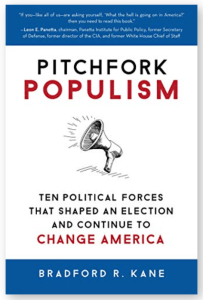Author Bradford R. Kane Supplies The Answer

In this post I am featuring the work of an author with deep roots in political history, government, and social justice.
(Full disclosure: Bradford R. Kane is my cousin and I am very proud of him!)
“Pitchfork Populism; Ten Political Forces That Shaped An Election And Changed America” Prometheus Books; 2019) connects the dots from where we are now as a country to times, circumstances and players deep within the history of the United States that opened the doors to what we are living through now. Mr. Kane’s book offers a journey through this landscape that reveals the roller coaster of our history and the long tendrils of past events, strategies and divisions of intent that continue to affect our country today.

This book is a valuable tool for anyone seeking insight and clarity into the political forces that have shaped our country and offers an educated vision of what our future might look like. Kane’s well-crafted writing does a masterful job of explaining the context and history of a potentially confusing and multi-level subject without being dry or professorial. His personal stake in the world of politics and its consequences remains present in his writing giving the reader a human experience and a sense of just how relevant this analysis is to our own lives.
For those wondering whose agenda is being supported here, put your concerns aside. Kane views his subject from a non-partisan standpoint and has, in fact, a long-standing history of encouraging bi-partisan communication. Among many other efforts over a lifetime career in politics and public policy, Mr. Kane is the Founder and Executive Director of The Bi-Partisan Bridge, a resource for information with a mission of encouraging those with differing political views to find common ground.

Now, to show you that my admiration for cousin’s work is not just familial affection, here are some of his credentials:
Bradford R. Kane began his career in Congress as legislative counsel to Congresswoman Cardiss Collins (D-IL) and has served as counsel to the Energy & Commerce Subcommittee on Commerce & Consumer Protection, and as a member of President Clinton’s Task Force on Health Care Reform. Kane has also served the State of California as Deputy Controller, legislator and subsequently, deputy secretary for information technology. In the global arena, he was CEO of the International Commission on Workforce Development and a strategy council member of the United Nations Global Alliance on ICT & Development (UN GAID). He received his undergraduate degree from the University of California, Davis, and his law degree from Hastings College of Law.
As further proof of the heights Kane has reached with this book, there are the reviews (on the book cover and online at Amazon and Pitchforkpopulism.com) from the likes of William S. Cohen, former Secretary of Defense, Henry Cisneros, former Secretary of Housing and former Mayor of San Antonio, Jonathan Alter, MSNBC political analyst and best-selling author, and Leon Panetta, former White House Chief of Staff, former Secretary of Defense and former Director of the CIA.
To make this an even easier read, the author has constructed his book so that you can start with any chapter that interests you and jump around as the topics catch your eye. This engaging read left me with an appreciation of Kane’s offering of hope looking forward and his conclusion that we are at our strongest as a society and a country when we work together in unity and mutual respect.

You are so daring to read a political book, but it sounds like this one is less charged with partisanship, Tara, and just explains how we got here through social movements and governmental policy. I don’t think I’m in a good head space to read this right now, but it does seem like a good place to start, and I like how you mentioned the ability to jump around to different topics. Thanks for the thoughtful review. 🙂
LikeLiked by 1 person
Thank you so much, Diana, for taking the time to read my piece on Brad’s book. I know that politics can be a grating subject that often doesn’t fit into our day or our head space. So I am grateful you allowed room in yours to read my write up here. You are appreciated!
LikeLiked by 2 people
🙂
LikeLiked by 1 person
I appreciate Diana’s sentiment because I struggled last year as a blogger with the question of partisan politics — specifically: How much — if any — should I indulge on my blog? It became impossible (for me, anyway) not to get political, because politics was informing everything that was happening around us, from the coronavirus to George Floyd to the election.
I certainly didn’t want to be yet another “voice in the void” — because there were smarter, more informed authorities than me opining on these matters (like Brad!) — but I at least found a way to incorporate my polemical agenda in a way that was authentic to the identity of my blog. Nevertheless, I’ve enjoyed the break from all-politics-all-the-time over this past month, am very much looking forward, in the year ahead, to blogging about more hopeful matters — like our recommitment to the Paris Accord and the COP26 in Glasgow this November.
Still, I suspect scholars and sociologists and historians will spend the next twenty years trying to understand how, exactly, we arrived at this volatile sociopolitical inflection point. And I don’t think we will find our way out until we’ve come to terms, fully and soberly, with how we got here, so I’m eager to read Pitchfork Populism. Thanks for sharing this, Tara!
LikeLiked by 1 person
Wow!! Thats amazing!!!!!!!! Could you also go check out my teams blog we r just simple 8th graders trying to express our views! tsms8std.wordpress.com
Please follow!!
LikeLike